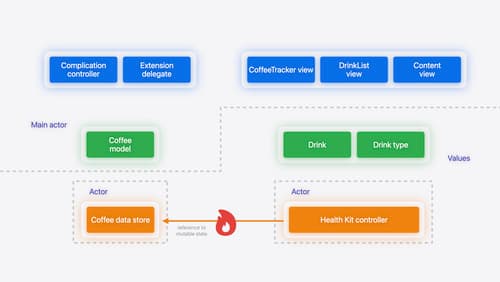what it does mean when a property by Mainactor
Asked on 2024-08-08
1 search
When a property or method is marked with @MainActor in Swift, it means that the property or method is isolated to the main actor. This ensures that any access to that property or method is performed on the main thread, which is crucial for maintaining thread safety, especially in UI-related code.
In the context of the session "Migrate your app to Swift 6" from WWDC 2024, the @MainActor attribute can be used to indicate that certain code should be executed on the main actor. This can be particularly useful when dealing with delegate callbacks or other asynchronous code that interacts with the UI. For example, if you have a delegate method that you know will always be called on the main actor, you can use @MainActor to tell the compiler about this guarantee, which helps avoid concurrency issues.
Here's a relevant excerpt from the session:
"So instead of the code starting a task I can write
@MainActor assume isolated. This doesn't start a new task to async onto the main actor, it just tells Swift that this code is already running on the main actor. Note that it's still perfectly possible for some part of the code to call this function from not the main actor. This is the same as with Swift functions today that assume they're being called from the main thread. A good way to protect against this is to add an assertion inside the function that you are indeed on the main actor, and that's whatassume isolateddoes. If this function is ever not called from the main actor it will trap and your code will stop running." (Migrate your app to Swift 6)
This means that by using @MainActor, you can ensure that your code runs on the main thread, and if it doesn't, the code will trap, preventing potential race conditions and data corruption.

A Swift Tour: Explore Swift’s features and design
Learn the essential features and design philosophy of the Swift programming language. We’ll explore how to model data, handle errors, use protocols, write concurrent code, and more while building up a Swift package that has a library, an HTTP server, and a command line client. Whether you’re just beginning your Swift journey or have been with us from the start, this talk will help you get the most out of the language.

Migrate your app to Swift 6
Experience Swift 6 migration in action as we update an existing sample app. Learn how to migrate incrementally, module by module, and how the compiler helps you identify code that’s at risk of data races. Discover different techniques for ensuring clear isolation boundaries and eliminating concurrent access to shared mutable state.
